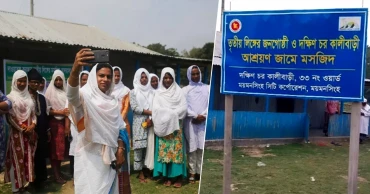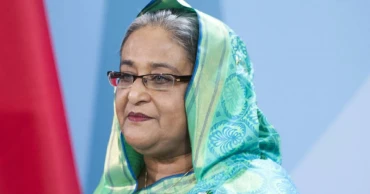mosque
Mosque, police station set on fire as Iran protests turn deadly
A mosque and a police station were set on fire in Iran as nationwide protests over economic hardship turned increasingly violent, with state media reporting that more than 100 members of the police and security forces have been killed since the unrest began.
Iran’s state television said on Sunday that 30 police and security personnel were killed in Isfahan province and six others in Kermanshah in the latest clashes. The semi official Tasnim news agency reported that a total of 109 security officers have died across the country during the protests.
State media also said a mosque was set on fire in the northeastern city of Mashhad on Saturday night, while a police station was torched during clashes in Tehran, according to videos circulating on social media. Burning vehicles and debris were seen blocking roads in several cities as protesters confronted security forces.
The Iranian Red Crescent Society said one of its staff members was killed during an attack on a relief building in Gorgan city in northern Iran.
The protests, which began in late December after a sharp fall in the value of Iran’s currency, have spread to many cities as people took to the streets over rising prices, inflation and worsening living conditions under Western sanctions. What started as economic protests has increasingly taken on an antigovernment tone.
Interior Ministry officials said the riots are now gradually subsiding, while the attorney general warned that those involved in violence could face severe punishment.
Speaking in parliament on Sunday, Speaker Mohammad Baqer Qalibaf warned the United States against any military action after US President Donald Trump threatened strikes if Iranian authorities kill protesters.
He said any attack on Iran would make Israel and all US bases and ships in the region legitimate targets.
Trump said on Saturday that the United States is ready to help Iranian protesters and again warned of possible military action.
President Masoud Pezeshkian, in a televised interview, pledged to overhaul Iran’s struggling economy and said his government is ready to listen to the people’s demands. At the same time, he accused the United States and Israel of trying to create chaos in Iran and called on citizens to stay away from violence.
Human rights groups have urged restraint, saying dozens of protesters have been killed and many more arrested during the crackdown.
With inputs from agencies
1 month ago
Tk 7 crore and counting: Donations at Pagla Masjid break all previous records
The counting of donations at Pagla Masjid, a 250-year-old mosque in Kishoreganj, has shattered all previous records. With some sacks still left, by 7:30pm on Saturday night, the total count had already crossed Tk 7.38 crore (7 crore 38 lakh).
The previous highest on record, in December 2023, had been Tk 6.32 crore, from 23 sacks of the 9 donation boxes of the mosque.
This time the 9 boxes yielded 27 sackloads of cash, apart from stones including gold jewellery, some foreign currency, and assorted items, which escape valuation.
Read more: Amid support and challenges, mosque for hijra community opens in Mymensingh
Shaukat Hossain, administrative officer of the mosque, confirmed the matter to the UNB correspondent.
“According to the latest information, after counting till 8:30 tonight, we already have a new record for the highest money received in the history of Pagla Masjid,” Hossain said.
He added that the mosque authorities are anticipating the count may even cross the Tk 8 crore mark this time around.
Read more: Top 10 Historical Mosques in Bangladesh
1 year ago
Amid support and challenges, mosque for hijra community opens in Mymensingh
In Mymensingh city, this Ramadan marked the opening of a pioneering mosque dedicated to members of the hijra community.
The "Third Gender Community and Dakshin Char Kalibari Ashrayan Mosque," situated on the picturesque banks of the Brahmaputra River, symbolizes a significant stride towards inclusivity in religious spaces.
Spanning an area of 33 decimals, the mosque not only serves the spiritual needs of the local hijra population but has also welcomed Muslims from the broader community.
The initiative, driven by the "Setu Bondhon Hijra Welfare Association," emerged in response to the discrimination and ridicule faced by hijra individuals in traditional mosques.
The derogatory treatment led to a collective decision to establish a dedicated space for worship, supported by a generous land donation and funding facilitated by the Mymensingh Divisional Commissioner, Ommey Salma Tanzia.
Read more: Empowering transgender and hijra communities a priority of the state: NBR chairman
The mosque's construction on donated land in Badikandi village was strategically planned to coincide with Ramadan, fostering a sense of community and belonging among the worshippers.
Featuring a modest single-story design with tin walls and a roof, the mosque includes a veranda, tube well, and toilets, ensuring basic amenities for its congregants. Additionally, the installation of three loudspeakers enables the regular call to prayer, further solidifying the mosque's role in the community's daily religious life.
Akhi, a member of the local hijra community, highlighted the transformative impact of the mosque, mentioning, "Throughout our lives, we have heard stories that when hijras die, their bodies are dumped in the river. There was no burial ground. Now, alongside our mosque, there is also a cemetery."
This statement underscores the profound significance of the mosque and adjoining cemetery as symbols of dignity and respect for the hijra community.
Joyita Tanu Hijra, president of the hijra association, recounted the journey towards establishing the mosque, from facing mockery in local mosques to securing the necessary land and funds through the support of the Divisional Commissioner and generous donors.
Read more: Sherpur Hijra community demands respectable jobs
The appointment of Hafiz Maulana Karimul Islam as the imam signifies the mosque's commitment to providing spiritual guidance and support to all worshippers, including the hijra community.
Abdul Motalib, president of the Mosque Management Committee, expressed the local community's support for the hijra community's endeavors, emphasizing the collaborative spirit in offering prayers and conducting religious activities.
The Divisional Commissioner, Ommey Salma Tanzia, praised the initiative as commendable, highlighting the mosque's role in offering a safe and welcoming space for hijra individuals to practice their faith.
Looking ahead, plans for expanding the mosque complex to include a madrasa, a primary school, and enhanced cemetery facilities are underway.
This ambitious vision reflects a hopeful future for inclusivity and acceptance within religious spaces, not only in Bangladesh but potentially setting a precedent for the world.
Read more: Enact law to protect rights of transgender, hijra community: Speakers
1 year ago
What's the significance of Ram Mandir in Ayodhya?
About 80 chartered flights have landed at the new international airport of India's holy city of Ayodhya for Monday’s partial opening of the controversial grand temple for one of Hinduism’s most revered deities, Lord Ram.
Ayodhya’s airport can barely accommodate the influx of private jets. “The planes will depart after dropping guests,” airport manager Saurabh Singh said.
The temple was built over an ancient razed mosque, and most political opposition leaders are boycotting the temple's opening, saying it doesn't befit a secular India.
However, the list of attendees boasts some of India's most influential people: Prime Minister Narendra Modi, industrialists Mukesh Ambani and Gautam Adani and Bollywood superstar Amitabh Bachchan.
Ahead of the upcoming general election, Modi’s Hindu nationalist party is using the elaborate consecration ceremony to lobby the country's Hindu majority.
Read more: Ancient Temples of Bangladesh: Remembering Their Past Glory
THE LEGEND OF RAM, THE PRINCE OF AYODHYA
The temple will be the sacred abode of one of the Hindu pantheon's most popular gods Ram, who Hindus believe was born at the exact site in Ayodhya.
Millions of Hindus worship Lord Ram with an intense belief that chanting his name in times of adversity will bring peace and prosperity, and most of those who practice Hinduism keep idols of Ram in their homes. Major Hindu festivals like Dussehra and Diwali are associated with mythological tales of Ram extolling the virtues of truth, sacrifice and ethical governance.
The mythological Hindu epic “Ramayan," which tells the story of Ram’s journey from prince to king, has often been adapted in popular culture. One of the most-viewed fabled shows is the TV series “Ramayan” created in the 1980s which continues to have a faithful audience.
Ram’s divinity is not only the dominant religious force in India but also part of the ancient cultural heritage in countries like Thailand, Indonesia, Myanmar and Malaysia.
Read more: A Hindu temple built atop a razed mosque in India is helping Modi boost his political standing
A TEMPLE RISES
Spread over nearly 3 hectares, the temple — which is still being built— has an estimated cost of $217 million. It's made with pink sandstone, adorned with intricate carvings, and has 46 doors — 42 of which will have a layer of gold.
Anil Mishra, a member of the trust overseeing the construction, said the temple blends traditional design with cutting-edge technology and is “crafted without the use of iron, steel, or cement."
A 1.3-meter (4.25-foot) dark stone sculpture depicting Ram was installed in the temple’s inner sanctum for Monday’s consecration. The religious ritual of “Pran Pratishtha," which signifies giving life to the idol, will be conducted according to Hindu Vedic scriptures. The deity can then receive and bless devotees.
After the ceremony, the temple will open to the public and an estimated 100,000 devotees are likely to visit daily, authorities say.
AYODHYA, PAST AND PRESENT
The city known for its narrow lanes crowded with Hindu pilgrims and shops selling miniature Ram idols, has been given a facelift with modern infrastructure and services. Ayodhya’s modest airstrip has grown into an expansive international airport with a 2.2-kilometer (about 1.4-mile) runway in the first phase. The clean railway station has a daily passenger capacity of about 50,000 people.
“The historical and spiritual significance of Ayodhya makes it a compelling destination,” and a huge surge in demand is anticipated, said Ravi Singh, a representative of the Indian Hotels Company Limited.
THE CONTROVERSY
Ayodhya has been at the center of India’s turbulent politics and the Hindu majoritarian quest to redeem the country’s religious past for decades. Its diverse, multicultural past was overrun by strident Hindu nationalism after mobs demolished the 16th-century Babri mosque in 1992.
Hindus won a prolonged legal battle in 2019, allowing them to build the temple. Hindus make up about 80% of India’s population but the country is also home to some 200 million Muslims who have frequently come under attack by Hindu nationalists.
Modi has been the face of an unprecedented, and unapologetic, fusion of religion and politics in India and led the temple’s groundbreaking ceremony in 2020.
Critics say the idea of a diverse, constitutionally secular state leading a Hindu religious ritual is deplorable. Most opposition leaders have declined the invitation, saying the event is being used for political campaigning by Modi's Bharatiya Janata Party (BJP) which promised to build a Ram temple as part of its election strategy.
Modi has asked people to publicly celebrate the consecration by lighting lamps at homes and temples. The message is clear: Mobilization of Hindu voters will be a key issue in the upcoming national election as Modi looks to extend his rule for a record third-consecutive term.
Read more: India's Modi is set to open a controversial temple in Ayodhya in a grand event months before polls
2 years ago
Claims of ‘concentration camps’ in China's Xinjiang baseless: Imam of largest mosque in region tells Bangladesh media delegation
Id Kah Mosque, the largest mosque in Xinjiang, China draws many tourists from home and abroad.
Located at the center of Kashgar Old City, the mosque is considered one of the local landmarks.
Kashgar was historically important for its position on the ancient Silk Road, officials said.
"The mosque can accommodate around 20,000 people during the two major religious celebrations," Imam of the mosque, Mohammad Jummah, told a visiting Bangladesh media delegation.
Muslims gather at the mosque each Friday for Jummah prayers, apart from the five regular prayers each day, he said.
Residents of Kashgar enjoy better life with the growing presence of religious tourists that boost their business, officials said.
Read: PM Hasina inaugurates 50 more model mosques
The Imam of the mosque trashed the claim that China's Xinjiang Uygur Autonomous Region has "concentration camps," calling it baseless.
"We don't believe there are any kind of concentration camps. This is just a lie," Imam Mohammad Jummah said, adding that there was an "ulterior motive" behind what he says "such baseless claims and propaganda."
He also said, "I am 53 years old. I have never seen any accident or violence in my life."
Recently, envoys from 14 countries, including Brazil, Iran, Indonesia, Ecuador and Senegal, visited China's Xinjiang Uygur Autonomous Region at the invitation of China's Ministry of Foreign Affairs.
Read: Shat Gombuj Mosque abuzz with tourists
2 years ago
PM Hasina unveils 50 more model mosques across Bangladesh
Prime Minister Sheikh Hasina on Monday inaugurated 50 more model mosques and Islamic cultural centres across the country in the fourth phase joining virtually from her official residence Ganabhaban.
With the new ones, she has so far inaugurated 200 mosques out of 564 being built at a cost of Taka 9,435 crore all over the country.
The construction of the remaining mosques and Islamic cultural centres is scheduled to be completed by June, 2024
Earlier, she opened 50 mosques each in the first phase on June 10, 2021, in the second phase on January 16 this year and the third phase on March 16.
The model mosques and Islamic cultural centres include separate places for ablution and namaj along with air-condition system.
Also Read: Mujibnagar Day: PM pays tribute to Bangabandhu
Besides, there will be registration and training arrangements for hajj pilgrims, Imam training centre, research centre and Islamic library, autism corner, ritual system before burial, car parking facility, hifzakhana, pre-primary education and Quran learning arrangement, conference room for Islamic cultural activities and Islamic dawat, Islamic books sale centre, boarding facility for local and foreign guests along with the mosques.
Being imbued with the spirit of Islam and following the footsteps of Father of the Nation Bangabandhu Sheikh Mujibur Rahman, the prime minister has come up with the idea of constructing 564 model mosques across the country.
The purpose of the project is to publicise Islamic brotherhood and its values as well as disseminate the essence of Islam against extremism and militancy as the religion never supports those.
Also Read: Protect overseas job seekers from frauds, middlemen: PM Hasina
It would also put concentration on creating awareness against terrorism and violence against women along with disseminating development activities of the government.
Under category A, some 69 four-storey mosques having the elevator facility and a floor space of 2,360.09 square metres each are being constructed in 64 districts and city corporation areas.
Under category B, 475 mosques are being built with a floor space of 1680.14 square metres each, while 16 mosques under C category in coastal areas will have a floor space of 2,052.12 square metres each.
Tungipara Upazila in Gopalganj district and Bishwanath Upazila of Sylhet district were also connected to the programme where the local lawmakers, public representatives, political parties' leaders, government officers, alem-ulama and common people were present.
Also Read: US Congress introduces resolution commending Bangladesh, its socioeconomic progress
A video-documentary on the model mosques and Islamic cultural centres was screened at the function.
With State Minister for Religious Affairs Md Faridul Haque Khan in the chair, secretary of the ministry Kazi Enamul Hassan delivered welcome address at the function.
Prime Minister’s Principal Secretary Md Tofazzel Hossain Miah moderated the programme.
2 years ago
Muslims around the world consider climate during Ramadan
In the heart of Jakarta, the grand Istiqlal Mosque was built with a vision for it to stand for a thousand years.
The mosque was conceived by Soekarno, Indonesia’s founding father, and was designed as an impressive symbol for the country's independence. Its seven gates — representing the seven heavens in Islam — welcome visitors from across the archipelago and the world into the mosque's lofty interior.
But they don't just see the light here. It fuels them.
A major renovation in 2019 installed upwards of 500 solar panels on the mosque's expansive roof, now a major and clean source of Istiqlal's electricity. And this Ramadan, the mosque has encouraged an energy waqf — a type of donation in Islam that continues to bear fruit over time — to grow its capacity to make renewable power.
Her Pramtama, deputy head of the Ri’ayah — or building management — division of Istiqlal Mosque, hopes that Islam's holiest month, when the faithful flock to mosques in greater numbers, can provide momentum to Istiqlal's solar project through donations.
The mosque's climate push is just one example of different “Green Ramadan” initiatives in Indonesia and around the world that promote an array of changes during the Muslim holy month, which has fasting and, in many cases, feasting elements as people gather to break their fasts.
In a month where restraint and charity are emphasized, recommendations can include using less water while performing the ritual washing before prayers, replacing plastic bottles and cutlery during community iftars with reusable ones and reducing food waste. Other suggestions include carpooling to mosques, using local produce, emphasizing recycling and using donations to fund clean energy projects.
For the world to limit the effects of climate change — which is already causing worsening droughts, floods and heat waves — the use of dirty fuels for electricity and transport, petrochemicals to make products like plastics and the emissions from food waste in landfills all need to be drastically slashed, scientists say. Though individual initiatives are just a small part of that transition, experts say growing momentum behind climate goals can have an effect.
Groups taking an Islamic-based approach often highlight environmental understandings of certain Quranic verses and sayings and practices of Prophet Muhammad about the earth, water and against wastefulness.
Last year, at a meeting of the Muslim Congress for Sustainable Indonesia, the country’s vice president Ma’ruf Amin called on clerics and community leaders “to play an active role in conveying issues related to environmental damage” and asked for concrete action on climate change including through donations to solar projects like those at Istiqlal Mosque.
Muhammad Ali Yusuf, a board member at the faith-based Nahdlatul Ulama’s Institution for Disaster Management and Climate Change in Indonesia, said spreading awareness about clean energy is a “shared responsibility” for Muslims, where mosques' own solar panel installations can be catalysts toward a greater transition.
In the United States and Canada, environmental groups that began springing up in Muslim communities in the mid-2000s independently from one another formed “green Muslim understandings” from within their religious traditions, according to Imam Saffet Catovic, a U.S. Muslim community environmental activist.
“In some cases, the mosques were receptive to it,” he said. In others, mosque leaders, “didn’t fully understand” the drive, he added.
Ramadan offers a “possibility for ecological training that’s unique to the Muslim community,” Catovic said. “Thirty days allow someone to change their habits."
The Islamic Society of North America website calls on Muslims to be “an eco-friendly community”, saying looking after the environment is “based upon the premise that Islam has ordained us to be the stewards and protectors of this planet.”
Some mosques and Muslims around the world are heeding such calls, one small step at a time.
Ahead of Ramadan this year, the mosque at Al Ma’hadul Islamic Boarding School in Indonesia received solar panels through Islamic donations, supplying enough energy for the mosque's entire needs. The electricity from the solar panels also lights up schools and roads in the vicinity.
The Nizamiye Mosque in Johannesburg, South Africa, with its towering minarets and spacious interior, has a roof dotted with domes and solar panels that help keep the power on at the mosque and its surrounding schools, clinic and bazaar.
The 143 panels cover over a third of the complex's energy use in a country that has struggled in recent years to provide enough electricity through its strained grid.
In Edison, New Jersey, Masjid Al-Wali¸ a mosque and community center, has been adopting changes such as selling reusable water bottles to members at cost and installing more water coolers to discourage the use of disposable plastic bottles, said board member Akil Mansuri.
“Preserving the environment is the Islamically right thing to do,” Mansuri said. “People accept the message, but adoption is always slower.”
Several years ago, Masjid Al-Wali, whose activities include an Islamic school and monthly community dinners, installed solar panels.
Meals this Ramadan for the mosque’s community iftars come in plastic pre-packaged boxes for now, Mansuri said. But mosque leaders encourage members to take leftovers and reuse the boxes, instead of throwing them away, he said, adding he hopes alternatives can be found next Ramadan.
In the United Kingdom, Projects Against Plastic, a Bristol-based charity, is leading a plastic-free Ramadan campaign.
“I feel like, as a Muslim, that mosques are the hub of the communities and they should take a little bit more leading role for sustainability and toward recycling,” PAP founder Naseem Talukdar said. “During the month of Ramadan is where I’ve really seen a ridiculous amount of plastic being used and thrown away.”
Mosques are urged to raise awareness on plastic pollution and reduce reliance on single-use plastic. Seven Bristol mosques participated in a pilot project last year, with varying results, and a national campaign, with more than 20 participating mosques, was rolled out this year.
Besides education, another challenge is when mosques don’t have enough funds to buy reusable cutlery, dishwashers and water fountains.
“We knew we were going to hit some hard walls and some pushbacks, but, to be honest, the engagement that we’ve seen so far, it was a little overwhelming,” Talukdar said. “Even though the progress is slow, but there’s a real appetite for this kind of initiative within the mosque."
Ummah for Earth, an alliance-led initiative that aims to empower Muslim communities facing climate change, is urging people to pledge to adopt one eco-friendly practice during Ramadan. Options include asking an imam to address environmental issues, donating to environmental charities and shopping sustainably.
“Many Muslims are not aware that there are environmental teachings in the Quran and the sayings of the prophet and that they have a role that they can play to protect the planet,” said Nouhad Awwad, Beirut-based campaigner and global outreach coordinator for the Ummah for Earth project at Greenpeace MENA.
As they work to raise awareness, campaigners often encounter the argument that climate change is “destined” and that “you cannot change God’s destiny,” Awwad said.
“We’re trying to change the narrative,” she said. “We have things that we can do on an individual level, on a community level and on a political level.”
2 years ago
Militant who killed 101 at Pakistan mosque wore uniform
A suicide bomber who killed 101 people at a mosque in northwest Pakistan this week had disguised himself in a police uniform and did not raise suspicion among guards, the provincial police chief said on Thursday.
Moazzam Jah Ansari said the bomber had been identified and police were close to arresting members of the network that was behind Monday's attack, one of the deadliest ever in Peshawar, the capital in the Khyber Pakhtunkhwa province.
“We will avenge the martyrdom of each and every policeman," Ansari told a news conference.
The blast collapsed the roof of the 50-year-old mosque, killing 101 people, mostly policemen. Two hundred twenty-five people were injured.
Ansari spoke a day after dozens of police officers in a rare move joined a peace march organized by the members of civil society groups in Peshawar, demanding protection for themselves.
Also read: Pakistan blames 'security lapse' for mosque blast; 100 dead
Hours after the bombing, Pakistan's Defense Minister Khawaja Mohammad Asif accused the Pakistani Taliban, known by the acronym TTP, of carrying out the attack, saying they were operating from neighboring Afghan territory. Pakistan wants the Afghan Taliban to take action against the TTP group.
Shortly after the bombing, a TTP commander claimed responsibility, but more than 10 hours after the attack the chief spokesman for the group distanced the TTP from the carnage, saying it was not its policy to attack mosques.
On Wednesday, Afghanistan’s Taliban-appointed foreign minister, however, had asked Pakistani authorities to look for the reasons behind militant violence in their country instead of blaming Afghanistan. The comments from Amir Khan Muttaqi came after Pakistani officials said the attackers who orchestrated Monday’s suicide bombing were using Afghan soil to target civilians and security forces.
More than 300 worshippers were praying in the Sunni mosque, with more approaching, when the bomber set off his explosives vest. Ansari said the attacker was not searched because guards assumed that he was one of their colleagues.
“Yes, I admit that it was a security lapse and I take responsibility for it," Ansari said.
Pakistan Prime Minister Shahbaz Sharif visited a hospital in Peshawar after the bombing and vowed “stern action” against those behind the attack. Pakistan, which is mostly Sunni Muslim, has seen a surge in militant attacks since November when the Pakistani Taliban ended a cease-fire with government forces.
The violence has increased in Pakistan since the Afghan Taliban seized power in neighboring Afghanistan in August 2021 as U.S. and NATO troops pulled out of the country after 20 years of war.
The TTP is separate from but a close ally of the Afghan Taliban.
___
Associated Press writer Munir Ahmed contributed to this story from Islamabad
3 years ago
Suicide bomber kills 59, wounds over 150 at Pakistan mosque
A suicide bomber struck a crowded mosque inside a police compound in Pakistan on Monday, causing the roof to collapse and killing at least 59 people and wounding more than 150 others, officials said.
Most of the casualties were police officers. It was not clear how the bomber was able to slip into the walled compound, which houses the police headquarters in the northwestern city of Peshawar and is itself located in a high-security zone with other government buildings.
Sarbakaf Mohmand, a commander for the Pakistani Taliban, claimed responsibility for the attack on Twitter. The main spokesman for the militant group was not immediately available for comment.
"The sheer scale of the human tragedy is unimaginable. This is no less than an attack on Pakistan,” tweeted Prime Minister Shahbaz Sharif, who visited the wounded in Peshawar and vowed “stern action” against those behind the bombing. He expressed his condolences to families of the victims, saying their pain ”cannot be described in words."
Pakistan, which is mostly Sunni Muslim, has seen a surge in militant attacks since November, when the Pakistani Taliban ended their cease-fire with government forces.
Earlier this month, in another attack claimed by the Pakistani Taliban, a gunman shot and killed two intelligence officers, including the director of the counterterrorism wing of the country’s military-based spy agency Inter-Services Intelligence. Security officials said Monday the gunman was traced and killed in a shootout in the northwest near the Afghan border.
Monday's assault on a Sunni mosque inside the police facility was one of the deadliest attacks on security forces in recent years.
The militant group, also known as Tehreek-e-Taliban Pakistan or TTP, is separate from but a close ally of the Afghan Taliban. The TTP has waged an insurgency in Pakistan in the past 15 years, seeking stricter enforcement of Islamic laws, the release of its members in government custody and a reduction in the Pakistani military presence in areas of Khyber Pakhtunkhwa province it has long used as its base.
More than 300 worshippers were praying in the mosque, with more approaching, when the bomber set off his explosives vest. Many were injured when the roof came down, according to Zafar Khan, a police officer, and rescuers had to remove mounds of debris to reach worshippers still trapped under the rubble.
Meena Gul, who was in the mosque when the bomb went off, said he doesn’t know how he survived unhurt. The 38-year-old police officer said he heard cries and screams after the blast.
Mohammad Asim, a spokesman at the main government hospital in Peshawar, put the death toll at 59, with 157 others wounded. Police official Siddique Khan the bomber blew himself up while among the worshippers.
Senior police and government officials attended the funerals of 30 police officers and arrangements to bury the rest were being made. Coffins were wrapped in the Pakistani flag their bodies were later handed over to relatives for burials.
Read more: Roadside bomb kills 6 people in north Afghanistan: Taliban
Peshawar is the capital of Khyber Pakhtunkhwa province, where the Pakistani Taliban have a strong presence, and the city has been the scene of frequent militant attacks.
The Afghan Taliban seized power in neighboring Afghanistan in August 2021 as U.S. and NATO troops pulled out of the country after 20 years of war.
The Pakistani government's truce with the TTP ended as the country was still contending with unprecedented flooding that killed 1,739 people, destroyed more than 2 million homes, and at one point submerged as much as a third of the country.
Mohmand, of the militant organization, said a fighter carried out the attack to avenge the killing of Abdul Wali, who was widely known as Omar Khalid Khurasani, and was killed in neighboring Afghanistan’s Paktika province in August 2022.
Afghanistan’s Foreign Ministry said in a statement that it was “saddened to learn that numerous people lost their lives and many others were injured by an explosion at a mosque in Peshawar” and condemned attacks on worshippers as contrary to the teachings of Islam.
Condemnations also came from the Saudi Embassy in Islamabad, as well as the U.S. Embassy, adding that "The United States stands with Pakistan in condemning all forms of terrorism.”
Cash-strapped Pakistan faces a severe economic crisis and is seeking a crucial installment of $1.1 billion from the International Monetary Fund — part of its $6 billion bailout package — to avoid default. Talks with the IMF on reviving the bailout have stalled in the past months.
Former Pakistani Prime Minister Imran Khan called the bombing a “terrorist suicide attack.” He tweeted: “My prayers & condolences go to victims families. It is imperative we improve our intelligence gathering & properly equip our police forces to combat the growing threat of terrorism.”
Sharif’s government came to power in April after Khan was ousted in a no-confidence vote in Parliament. Khan has since campaigned for early elections, claiming his ouster was illegal and part of a plot backed by the United States. Washington and Sharif dismiss Khan's claims.
3 years ago
30-year-old imam 'ends life' at Manikganj mosque
A 30-year-old imam allegedly ended his life by hanging from the ceiling of his room at a mosque in Manikganj’s Singair upazila on Thursday.
The deceased was identified as Md Ferdous Islam, the imam of Nayapara Jame Mosjid and son of Siddiqur Rahman of Barishal’s Muladi upazila. His body was recovered by the police around 10.30pm.
Ferdous left behind a purported suicide note. "No one is responsible for my death," read the note found in his room.
READ: 3 including SSC examinees killed in Manikganj road accidents
Local union parishad member Rezaul Karim said the imam even led devotees at Esha prayers in the mosque just before he killed himself around 9.30pm. "Locals spotted his body and informed police."
A headphone attached to his mobile phone was found near his body, he said.
Officer-in-charge of Singair police station Shafiqul Islam Mollah said, "It seems to be a case of suicide. But an autopsy can only confirm that. A case of unnatural death has been filed in this regard."
3 years ago









.jpg)








